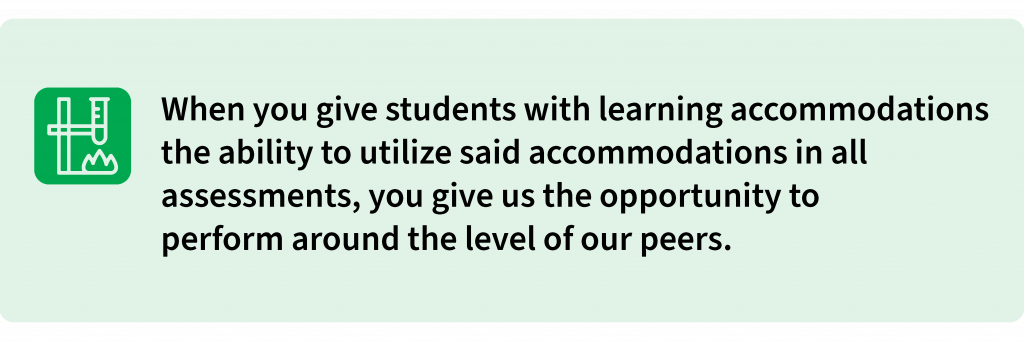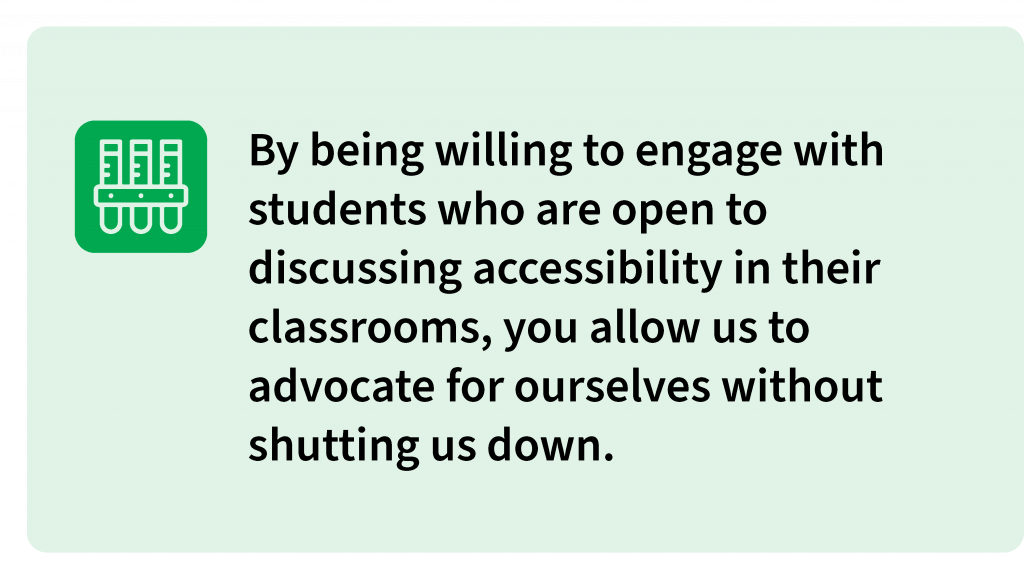12 Navigating a Teaching Lab with a Learning Disability

By Allison O’Rourke
I was diagnosed with my learning disabilities at a later age than many would expect; I was 19 and halfway through my first year of university. When I was a child, I struggled a lot with subjects like math and reading, but because nobody really talked about the variety of ways in which learning and developmental disabilities present across the genders, I was just told to try harder. Throughout grade school, I simply overcompensated for my disabilities in order to succeed. The obvious problem with this strategy being that by the time I got to university, I was not only exhausted from expending all of this extra effort to focus and compete academically with my peers, but I was also frustrated that I seemed to be working three or four times as hard as my friends and still not seeing results in terms of my grades.
With that being said, I will admit that having ADHD does give me abilities that can be useful in certain circumstances. I am an ace at multi-tasking, so being in the lab is second nature for me, where you have to keep track of 5 different parts of your experiment at once, which I can do without breaking a sweat and while having a conversation with everyone around me. But the second I have to write pre or in-lab quizzes at the lab bench, everything changes.
I remember in my first year biology labs, I failed every single one of my pre-lab quizzes, not only because the questions were just quickly put on the screen in front of us, but also because we were made to quickly do unit conversions with no calculator. As you can imagine, that did not exactly go well for me. My TA came up to me at one point and said “Why do you keep getting every question wrong, I explained how to do the conversions right before the quiz”, and at that point I couldn’t articulate why I could barely remember how many zeroes are in a thousand, let alone how many nm are in a cm, in order to explain why I was failing. It was the same scenario for other lab quizzes I wrote on the spot asking me about specific details in the lab procedure, like how many mL of cyanide we’re putting in the reaction mixture, because I cannot memorize things like that. But I show up every lab session being able to explain the big picture of the procedure and why we perform each step the way we do, and I prove that by usually getting results and being one of the first out the door at the end of the session.
 I’ve begun to think over the course of my time in university that pre-lab quizzes don’t accurately reflect students’ knowledge and understanding of lab procedures and course subject matter. Throughout the pandemic, we have proven that we as educators and learners are incredibly capable of adapting and using the internet and virtual platforms in order to assess students – we should consider taking of these principles back into the classroom with us. When you give students with learning accommodations the ability to utilize said accommodations in all assessments, you give us the opportunity to perform around the level of our peers, without implicitly or unintentionally othering us as soon as we walk through the doors of the lab.
I’ve begun to think over the course of my time in university that pre-lab quizzes don’t accurately reflect students’ knowledge and understanding of lab procedures and course subject matter. Throughout the pandemic, we have proven that we as educators and learners are incredibly capable of adapting and using the internet and virtual platforms in order to assess students – we should consider taking of these principles back into the classroom with us. When you give students with learning accommodations the ability to utilize said accommodations in all assessments, you give us the opportunity to perform around the level of our peers, without implicitly or unintentionally othering us as soon as we walk through the doors of the lab.
“Just because you give us the same tools and the same training, doesn’t necessarily mean we will be able to use the tools with the same level of proficiency.”
The second situation I wanted to briefly highlight is that of professors only going over assessments in a group setting instead of in one-on-one meetings with students. The logic here being that everybody has the chance to hear what the educator has to say, and nobody gets an unfair advantage. On the surface, I understand the reasoning behind this, however in practice it is more of an “equality” approach rather than an “equity” one. Just because you give us the same tools and the same training, doesn’t necessarily mean we will be able to use the tools with the same level of proficiency.
I personally have found one-on-one interactions with my professors to be far more rewarding than group discussions, as I have more freedom to express what I need, or how I need certain concepts explained to me in order for me to succeed. This way I am also not left with the guilt or the perception that my needs as a student are wasting time or taking away from the learning experiences of my peers. While I say that I’m okay going into a group assignment correction with my “hi I’m disabled please don’t judge me” disclaimer, there is unfortunately a certain level of guilt and shame that is accompanied by it. And by including my personal work in group discussions, unfortunately this increases the potential for creating an uninviting or hostile environment between me, my peers, and my educator.

So, where does all of this leave us? What can we feasibly do to make academia a more welcoming and equitable environment for neurodivergent students? It starts with listening. By being willing to engage with students who are open to discussing accessibility in their classrooms, you allow us to advocate for ourselves without shutting us down. As I mentioned, the guilt and shame of having a disability keeps many of us, myself included a lot of the time, from reaching our high levels of potential. Going into these conversations respecting each other’s experiences as educators and as neurodivergent students, we will hopefully be able to not only foster a learning environment where neurodivergent students are able to compete equally with their peers, but are also welcome to do so.

